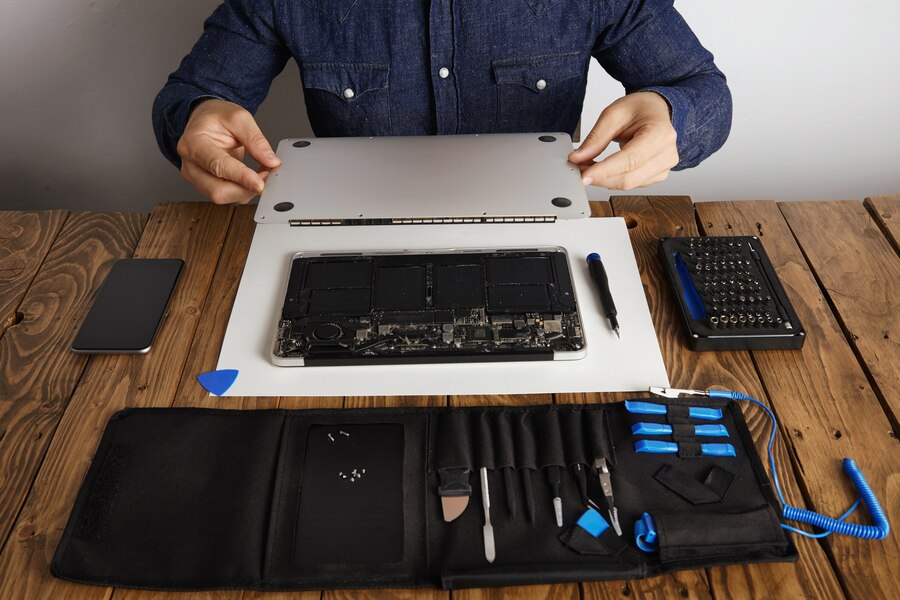Most Common MacBook Problems, Their Causes and Solutions

Have your MacBook developed an issue and you are clueless? This blog has you covered. The main issues reported by Mac users on MacBook are the battery life, slower operation, the problem of flickering screen, and display problems. Other common issues include connectivity, issues, problems with the sound and heat issues with the equipment. There is always a solution to each of the problems. This includes; rebooting the macbook, maintaining its cleanliness, increasing empty space, and eradicating bulky applications. The last resort is to get professional help from an expert MacBook repair technician.
Most Common MacBook Problems
Problem 1: Battery Draining Too Quickly
Another common problem with MacBooks is that their batteries degrade very fast. There are perceived conditions that affect the performance of a battery but the most common is that it decreases with time.
Reason:
- Too many background applications
- High brightness
- Outdated macOS or apps
- Faulty or old battery
Solutions:
Check Battery Health: To get the batteries condition use the steps: Open System Settings > Battery > Battery Health. If the status is “Service Recommended” it means it is time to replace the product.
Decrease Brightness: Dim down the screen in order to reduce the power being used.
Disable Background Apps: Use Activity Monitor to search the heavy apps and remove them
Software Update: This entails updating the operating system which is macOS plus all the apps existing in the application.
Low Power Mode: Low Power Mode can be accessed in the Battery Settings.
Problem 2: Overheating Problem
Other common problems that may be experienced with MacBooks include over heating which may be as a result of so many things.
Causes:
- Dust in the cooling system
- Running energy-consuming applications or games
- Ventilation paths are blocked
- Dusty fans
Solutions:
Dust Inspection: Shake off the dust particles in the vents and keyboards using compressed air but this is prohibited as it may lead to cancellation of your MacBook warranty.
Activity Monitor: Check on the temperature of the CPU and cease to run those program that generate a lot of heat.
MacBook Stand: Make sure your MacBook is standing on level and airy so that the air circulates around it.
SMC Reset: Intel-based MacBook: Turn off your MacBook and afterward press the Shift + Control + Option + Power for 10 seconds and then turn on your MacBook again.
Fans: If they are noisy or already faulty, then contact Apple Support.
Problem 3: Wi-Fi Connectivity Issues
The majority of MacBook users complain that their device has problems with slow or non-existent connections to a Wi-Fi network
Causes:
- Router
- Network configurations
- It runs from older versions of macOS and network drivers.
Solutions:
Restart Router and MacBook: More often it mitigates the connectivity issue.
Forget the Network and Reconnect: To do that, in System Setting > Network > Wi-Fi, select the network and click “Forget This Network.” Subsequently, link up and retype the password.
Reset: Reset the network interface.
Problem 4: Slow Performance
And the worst experience that a user of MacBook could feel is the slow operation of this magnificent machine, even if it slows down to accomplish such simple tasks.
Causes:
- Insufficient storage space
- Too many startup programs
- Running outdated software
- Malware
Solutions:
Free Up Storage Space: Delete irrelevant files and applications, and duplicate files and applications. Click Storage Management under System Settings > General > Storage.
Manage Startup Programs: Navigate to System Utilities > General > Login Items and disable unwanted start up items.
Run Malware Scan: Take the help of proper software like Malwarebytes to clean the hazardous malware.
RAM or Storage Upgrade: Hardware upgrade is by far the best way to optimize old MacBooks.
Problem 5: Unresponsive Keyboard
If your keyboard is unresponsive the problem may be with the software or the hardware of the device.
Causes:
- Keyboard keys are found to be chipped, have dust or debris underneath them
- Virus
- Hardware faults
Solutions:
Clean the Keyboard: To remove the dust it is advised to use compressed air which is safe on the MacBook.
Reboot MacBook: Your temporary software glitches can be fixed or eliminated by restarting the MacBook.
Test in Safe Mode: Perhaps, go and run the operating system through Safe Mode so that you can determine that the issue is caused by a third-party application.
Go to Apple Support: If for any reason you are unable to overcome it on your own the best thing that you are able to do is to seek help from a professional.
Problem 6: screen blinking or display problems
Experiencing graphics problems, or MacBook screen blinking is a disruption when using the device. It is not frequent, but it is highly concerning.
Causes:
- Software glitches
- Loose display cables
- Hardware malfunction
Solution:
Update macOS: Another place to check for updates is under System Settings tab and there in the General tab within the option Software Update.
Reset NVRAM/PRAM: Shut down your MacBook, then start pressing the Option + Command + P + R keys simultaneously until you see two alike Apple logos.
Check for External Display Issues: Take off any external display devices to check whether the issue is still present.
Run Apple Diagnostics: Power wash MacBook to start by holding the D key down to run a system check. For further detail follow the instructions on the screen.
Consult Apple Support: For issues that involve hardware you will need to take your computer to a professional to fix.
Problem 7: Audio Problems
Some of the common problems that MacBook users encounter include no sound, or even a distorted noise.
Causes:
- Incorrect audio settings
- Software bugs
- Faulty hardware
Solutions:
Check Volume Settings: Make sure that the volume is not turned down low and that it is at a very reasonable level.
Check Output Device: Finally click on the System Settings on your Ubuntu then Sound > System then on the right corner you will find a drop down menu of the Output device which you have to select from the list.
Restart Core Audio Service: Type Terminal in the spotlight and restart the audio system.
Apple Support: Depending on type, for continuous problems you may want professional assistance.
Conclusion
MacBooks have their advantages and disadvantages as well A disadvantage is that MacBooks are a bit costly than other laptops in the market. The regular problems can be solving easily through basic troubleshooting steps including battery issues, heating issues or screen problems. When it comes to conditions which may require frequent repairs or work with parts of the MacBook, consult with Apple Support or a certified technician to help your MacBook last as long as possible. There are things that any user can do to ensure that they get the most value out of the MacBook through servicing, updating, and even handling with a lot of caution.







